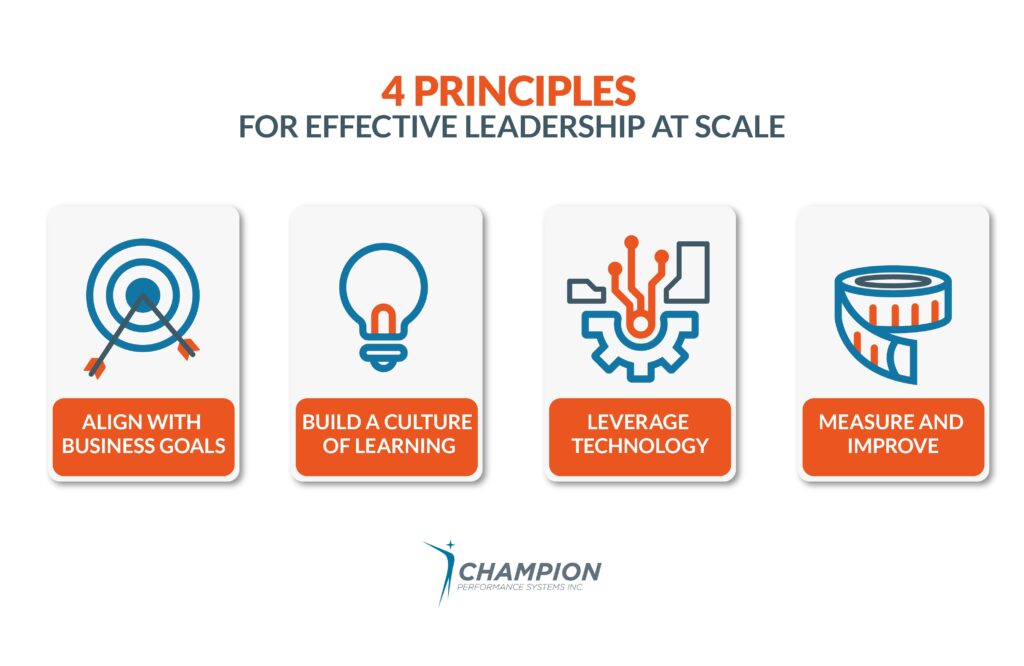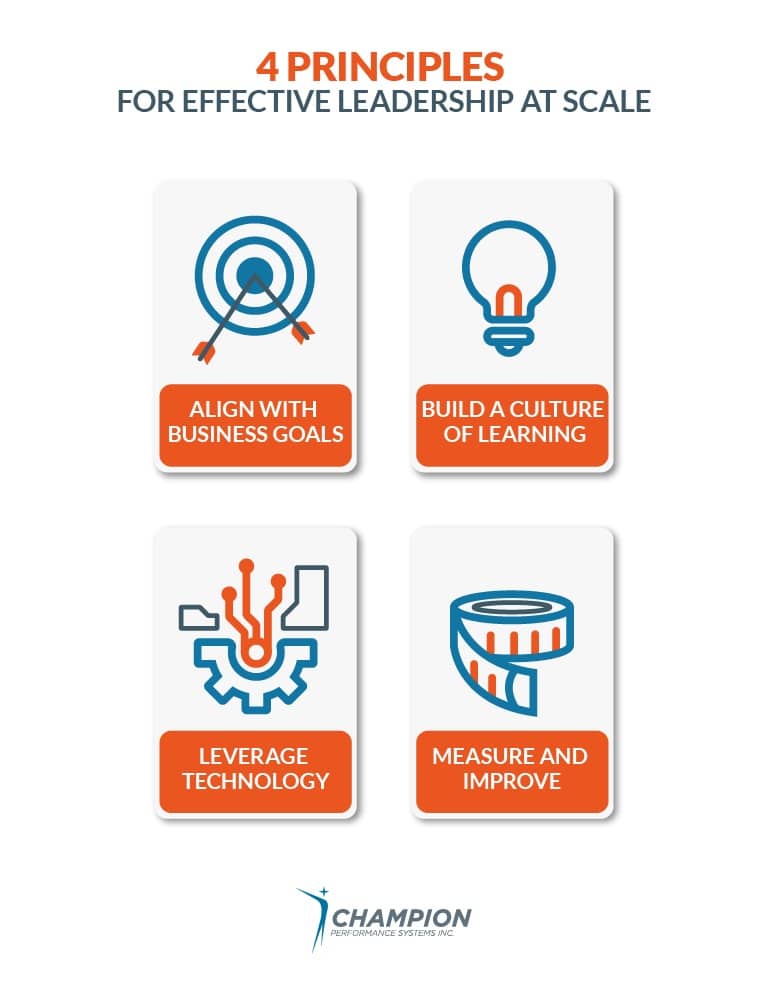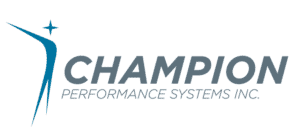In today’s rapidly evolving business landscape, the ability to scale an organization effectively is crucial for long-term success.
At the heart of this process lies the development of capable leaders who can navigate the complexities of growth. However, developing capable leaders at scale can be a complex process.
In this article, we discuss 4 concrete principles for building effective scalable leadership development programs.
Whether your organization is just beginning to expand or has already achieved considerable growth, these principles can help ensure that leadership development remains a priority and contributes meaningfully to the success of your business.
Understanding the Importance of Leadership Development at Scale
Effective leadership is crucial for growing organizations, as it directly influences the ability to navigate challenges and complexities associated with expansion.
Leaders in scaling organizations face unique difficulties, such as managing larger teams, maintaining company culture, and effectively allocating resources. As a result, continuous leadership development is essential to equip leaders with the right skills and knowledge to overcome these challenges and drive their organizations toward success.
4 Principles for Effective Leadership at Scale


To build an effective leadership development program at scale, it is important to focus on strategies that can help leaders navigate complex situations and drive growth. Here are four key principles that can help organizations build strong leadership pipelines and develop capable leaders who can guide their companies through periods of expansion.
Principle 1: Align Leadership Development with Business Goals
To be effective, leadership development programs must be aligned with the overall business objectives of the organization.
This means identifying what skills and knowledge leaders need to possess to help the company achieve its goals and designing development programs accordingly.
When designing a scalable leadership development program, it is important to ensure that the initiatives are aligned with the organization’s overall objectives. The objectives of the program should be closely linked to both individual leader growth and broader business goals.
Start by identifying the critical business goals and priorities that the organization aims to achieve. Use these goals to develop a leadership competency framework that outlines the specific skills, knowledge, and behaviors required for leaders to excel in their roles.
This framework serves as a foundation for designing and implementing customized development programs tailored to the unique needs of the organization.
Ensure that leaders possess the skills and capabilities needed to achieve the identified business goals by conducting regular assessments and providing targeted training and development opportunities. To maximize the impact of these efforts, it is recommended to prioritize high-potential leaders while still providing development opportunities for all team members.
Business goals play a key role in effectively scaling an organization. By aligning leadership development with business objectives, organizations can ensure that their leaders are equipped with the right tools to drive the company forward.
Principle 2: Build a Culture of Continuous Learning and Development
Effective leadership development involves more than just training programs or workshops. It requires creating a culture of continuous learning, where leaders are encouraged to seek out new challenges and opportunities to develop their skills.
To foster a strong foundation for scalable leadership development, it’s essential to create a culture that embraces continuous development. This can be achieved by providing ongoing coaching and mentorship, setting up peer-to-peer learning networks, and promoting a growth mindset across the organization.
This involves nurturing a growth mindset among leaders, which encourages them to view challenges and setbacks as opportunities for growth rather than failures. By fostering this mindset, leaders can more effectively adapt to the ever-changing landscape of a scaling organization and drive innovation.
Feedback plays a crucial role in continuous learning and development. By providing leaders with constructive feedback, they can learn from their experiences and improve their skills over time.
Implementing a coaching program can further support this growth by pairing experienced leaders with those in need of guidance. This not only helps leaders develop their skills but also encourages the transfer of knowledge and expertise within the organization.
Cross-functional collaboration and learning opportunities can also contribute to a culture of continuous development.
By encouraging leaders to work with colleagues from different departments and backgrounds, they can gain new perspectives and insights into the various aspects of the organization. This broadened understanding can lead to better decision-making and improved leadership capabilities.
Principle 3: Leverage Technology to Scale Leadership Development
Technology has made it easier than ever to scale leadership development programs across large organizations.
By leveraging tools such as online learning platforms, virtual coaching, and digital assessments, organizations can provide personalized leadership development opportunities to leaders at all levels of the company.
This not only helps to improve the effectiveness of leadership development programs, but also makes it easier to track progress and measure impact.
Principle 4: Measure the Impact and Continuously Improve
Establishing clear metrics to evaluate leadership development programs is crucial for understanding their effectiveness. These metrics should align with the organization’s overall objectives and track progress toward achieving specific goals.
Key performance indicators (KPIs) might include improvements in decision-making, collaboration, and problem-solving skills, as well as employee engagement and retention rates.
Regularly assessing the effectiveness of development initiatives ensures that the program remains relevant and impactful.
This can be done through various methods, such as surveys, feedback sessions, and performance reviews. By analyzing the data gathered from these assessments, leaders can identify areas for improvement and make necessary adjustments to the program.
Adapting and refining programs based on feedback and outcomes is essential for continuous improvement.
By staying responsive to the changing needs of the organization and its leaders, development programs can remain agile and effective in addressing new challenges and opportunities. This adaptability also helps ensure that the program remains aligned with the organization’s strategic goals.
Best Practices for Implementing Scalable Leadership Development Programs

To implement scalable leadership development programs, organizations must consider a range of best practices related to accessibility, flexibility, and inclusion.
Utilizing digital platforms, such as e-learning courses, webinars, and virtual classrooms, can provide leaders with more accessible and flexible learning experiences. This allows busy professionals to engage with the content at their own pace and convenience while reducing the cost and logistical challenges associated with traditional, in-person training.
When designing learning experiences, it is also important to consider the different needs and preferences of leaders. This can be achieved by offering a blend of learning opportunities, including self-paced online courses, interactive workshops, and experiential learning activities.
By catering to different learning styles and preferences, organizations can ensure that their leaders have the necessary resources to develop their skills and capabilities.
Creating an open and collaborative atmosphere is another vital component of effective leadership development programs. This includes providing regular feedback, recognizing and celebrating the progress made by leaders, and creating a safe space for open dialogue and knowledge sharing.
Encouraging leaders to openly discuss their challenges and learn from one another can lead to a more collaborative and growth-oriented culture within the organization.
Maximizing the Return on Investment in Leadership Development
Investing in leadership development is essential for the long-term success of a scaling organization. To maximize the return on investment (ROI) in these programs, it is crucial to ensure that they align with the organization’s strategic objectives and contribute to organizational growth.
The long-term benefits of leadership development are numerous, including increased employee engagement, improved decision-making, enhanced innovation, and the ability to navigate complex challenges. These benefits contribute to a more resilient, adaptable, and successful organization.
To guarantee that development programs align with the organization’s strategic objectives, it is vital to establish a clear connection between the skills and competencies being developed and the key business goals.
This alignment ensures that leaders possess the necessary capabilities to drive the organization forward and achieve its objectives.
Evaluating the success of leadership development programs requires the establishment of clear metrics and indicators. These assessments should measure the effectiveness of the initiatives on both individual leader growth and overall organizational performance.
By regularly reviewing these metrics and refining the programs based on feedback and outcomes, organizations can optimize their investment in leadership development and ensure a positive impact on their scaling efforts.
Unlock the Full Potential of Your Leadership Team with Champion PSI

Successful leadership development at scale is a complex but essential process.
By aligning your leadership development programs with business goals, cultivating a culture of continuous learning, and consistently measuring the impact and improvement of these initiatives, you can ensure that your leaders are well-equipped to navigate the complexities of scaling a business.
Champion PSI understands the importance of tailored coaching solutions that empower leaders to achieve both personal and professional growth.
If you’re seeking guidance on how to develop and implement scalable leadership development programs for your organization, we invite you to reach out to us for support. Our team of experienced coaches and consultants can provide valuable insights and practical advice, helping you drive success as you scale your organization.
Reach out to Champion PSI today and take the first step toward a brighter future for your organization.










